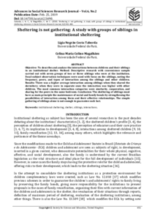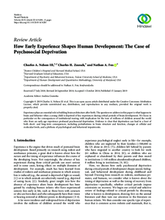Displaying 201 - 210 of 726
This theoretical-empirical study is based on two particular case studies of families bringing up children from institutional care in Slovakia.
The present study addressed institutionalised children and staff members' perspectives about bullying in Residential Care settings (RCs) in five European countries (Bulgaria, France, Greece, Italy and Romania.).
This study draws upon data from the Bucharest Early Intervention Project (BEIP), a longitudinal study exploring the impact of severe psychosocial deprivation on child health and development to examine the relationship between telomere length and psychopathology.
To ensure protection of children from institutional abuse, there is an urgent need to review the existing laws in terms of their efficacy to protect children and feasibility in implementation. The present study suggests possible solutions, by trying to understand standardized and effective models of care systems and mechanisms.
The purpose of this paper is to describe and analyze the interactions between children and their siblings in an institutional shelter in Brazil.
This article examines the aftercare experiences of young people who have recently left a residential care institution in Lagos State, Nigeria.
The current study compared behavioral and adrenocortical functioning of maltreated and comparably aged (1.5–3 years) institutionally-reared children soon after (1.5–2.5 months) placement in foster care or adoptive homes, respectively.
The question addressed in this paper from the Neural Plasticity journal is what happens to brain and behavior when a young child is deprived of key experiences during critical periods of brain development.
The current study examined longitudinal trajectories of memory and executive functioning (EF) from childhood to adolescence in the Bucharest Early Intervention Project, a randomized controlled trial of foster care for institutionally reared children in Romania.
This study used magnetic resonance imaging to compare adolescent AIDS orphans reared in institutions with a sex- and age-matched group of healthy adolescents reared in families in China using a voxel-based morphometry analysis.


